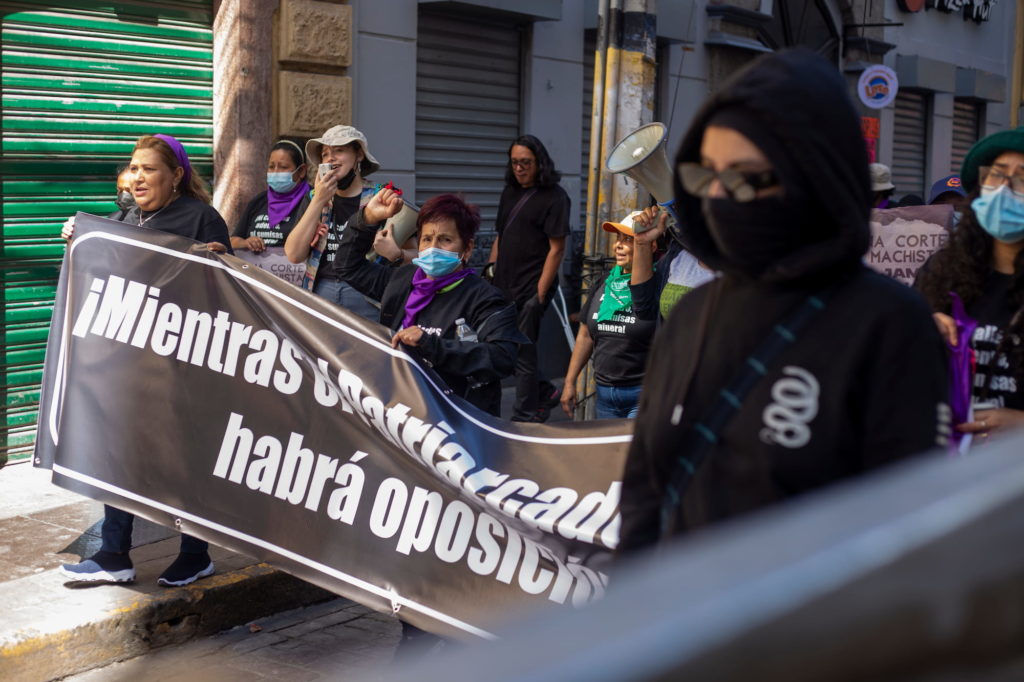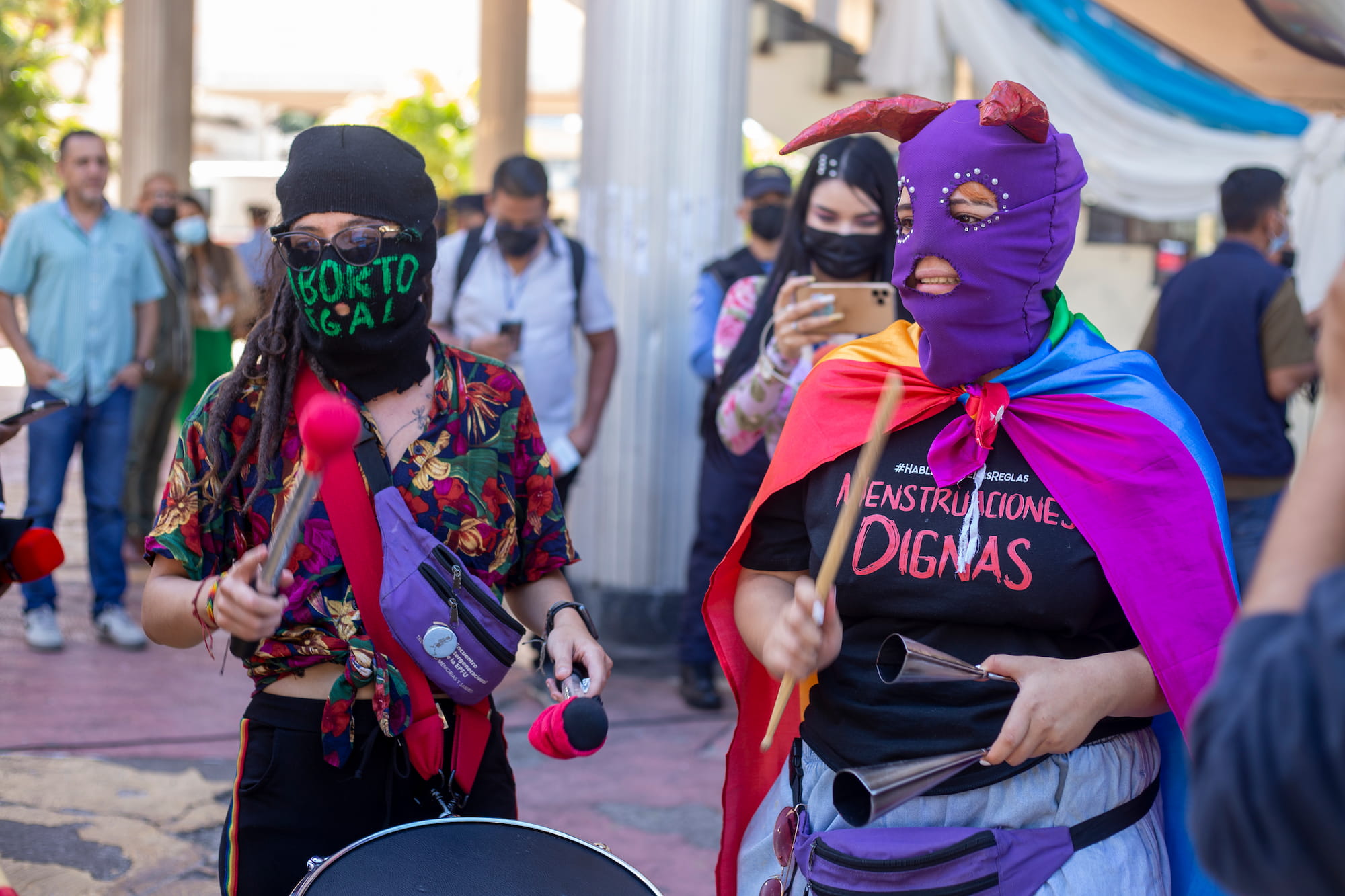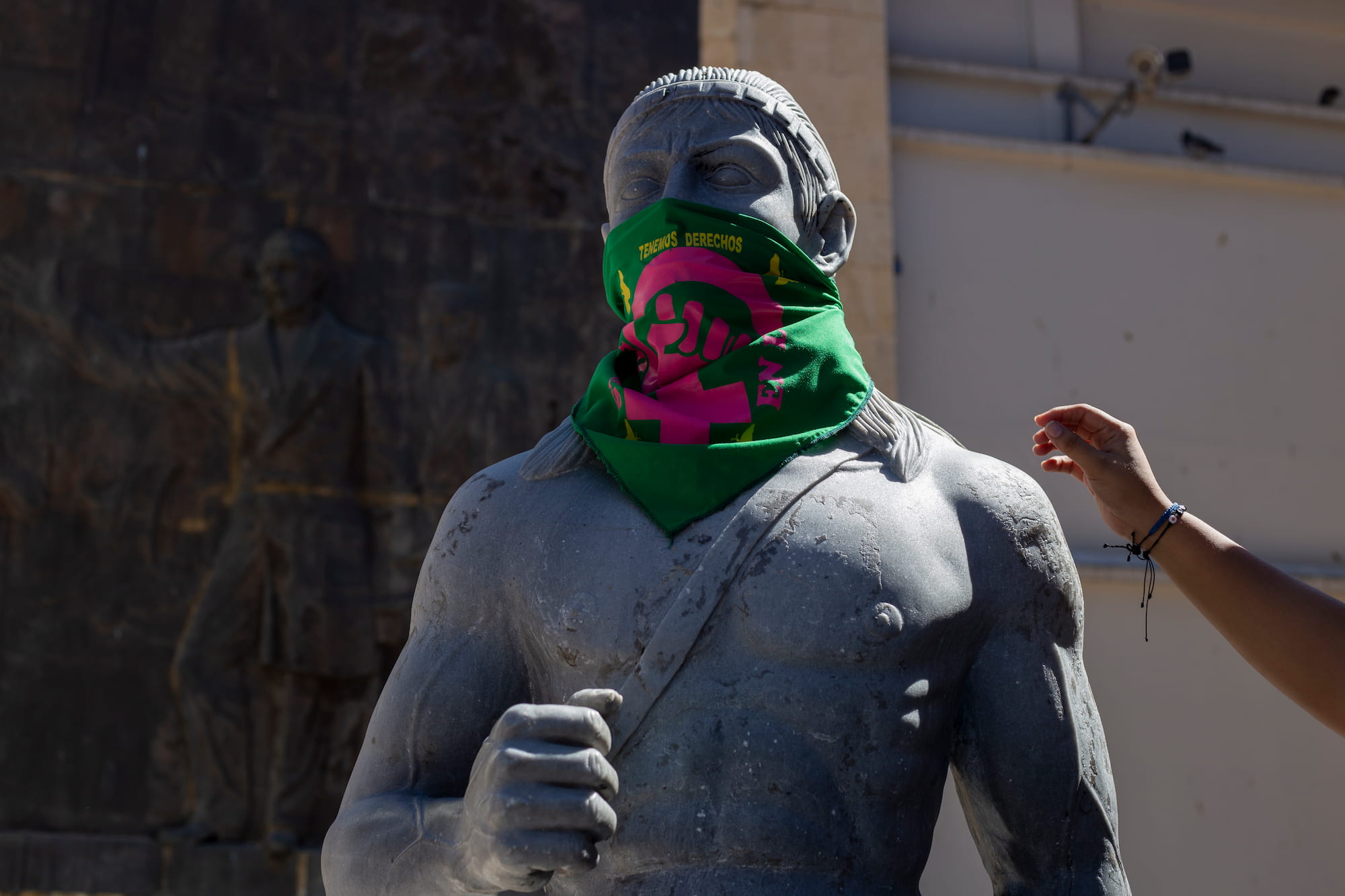On January 27, as President Xiomara Castro’s government marked one year in office, feminist activists counted 365 femicides over that same period - one for every day of 2022. Indeed, according to the Public Prosecutor's Office, femicides and violent deaths of women in Honduras increased 51% in 2022. Reporting on the government’s achievements, Vice President Doris Gutiérrez said there were “three gifts” Castro must yet deliver to the women of Honduras: the Law Against Violence towards Women, the Safe Houses Law and reforms to the Penal Code.
Text: Vienna Herrera
Photo: Fernando Destephen
Translation: Ann Louise Deslandes
On Tuesday January 27, President Xiomara Castro’s government marked one year in power.
On that same date, national feminist organization Ecumenical Women for the Right to Choose marked 365 femicides (defined in Honduras as the murder of a woman for reasons motivated by her gender) over that very twelve months – one for every day of the year.
Feminist activist Jinna Rosales says she is concerned about the violence.With the knowledge that a woman is murdered every day, “we do not see an outburst from the authorities or from this government to stop violence or femicides”, said Rosales, who is a member of the feminist ‘
Strategic group for the emergency contraceptive pill – Plan B (Grupo Estratégico [por las] Pastillas Anticonceptivas de Emergencia – GE-PAE).
When it comes to responding to femicide investigations, Rosales sees no difference between how the Honduran justice system operates under Xiomara Castro and how it operated before.
“We have a justice system that remains the same as that of previous governments” declared Rosales.
Honduras’ femicide toll was spotlit by news of the violent death of three Garífuna womenA on January 15. The first massacre recorded this year, it also occurred in the community of Travesía in Puerto Cortés, one of the 73 municipalities that have been subject to a state of emergency since December 2022.
In a Twitter post, President Castro expressed her “solidarity” with the “3 Garífuna sisters”, saying that the police would be announcing the scope of the investigation and ending with the comment, “no more impunity.”
For Jinna Rosales, Castro’s words indicate that, as her second year in office begins, the President should reconsider her approach to gender matters.
To express simply “solidarity” is not “a guarantor of human rights,” said Rosales.
“It is not that I am disparaging the word [solidarity] or the expression”, the activist explained, but “the President’s words should be more forceful and framed within [the power she has] as the government.”
On January 24, police authorities announced that David Alexander Lambert had been arrested as the alleged perpetrator of the murders of the three Garífuna women. One of the women had been Lambert’s partner.
According to information recorded by the Public Prosecutor’s Office, the number of violent deaths of women in 2022 was 398, an increase of 138 cases over the previous year. Analysis by the Women’s Law Center (Centro de Derecho de Mujeres – CDM) shows that at least 304 of these cases are femicides.
Violent Deaths of Women- Public Ministry (2019-2020)
Speaking to Contracorriente, Migdonia Ayestas of the National Violence Observatory at the National Autonomous University of Honduras explained that 25 cases of violent deaths of women were registered in December 2022, while the figure had been exceeded in January before the end of the month.
Ayestas said it was also worrying that “beyond that figure, there is an increase in the number of cases and in the cruel and inhuman way in which they are happening”.
On January 15, the same day that the three Garífuna women were murdered, the media reported the femicide of Jessica Vallecillo Cruz, a 21 year old woman from the department of El Paraíso, who died from burns to 75% of her body after being attacked by her partner, 56 year old Andy García.
Feminist activist Sandy Arteaga explained that in cases like this the media tend to be very sensationalist: “they normalize [the violence] and feed it back, instead of explaining that it was a man who murdered his partner in an abuse of power.”
“We have to talk about economic inequality, about the circles of violence”, Arteaga added.
Gender violence in Honduras: How has the Castro government responded?
As it was a campaign promise and a part of Castro’s national government plan, on January 27 Vice President Doris Gutiérrez presented a report to Congress on achievements against the plan. In it, Gutiérrez highlighted the creation of the Women’s Secretariat and the implementation of high-level roundtables on a gender-sensitive budget.
At the same time, Gutiérrez acknowledged that there is still a long way to go to guarantee women’s rights in Honduras. In her speech she spoke of “three gifts” that Congress should offer to women: approval of the Law against Violence towards Women, approval of the Safe Houses Law and reform of the Penal Code which currently, she said, currently favors a large number of aggressors including those who commit rape and femicide.
Women’s and feminist organizations have been working on the Law against Violence towards Women for more than four years and presented it to President Xiomara Castro on March 8, 2022. On that day she promised to send it to the National Congress for approval. The law has reached Congress but has not yet been deliberated.
Sandy Arteaga said she is concerned about “who is reviewing the law and with what intentions”, and whether any parts will be removed.
“If they take away much that will be of benefit to women it [will be] like we have nothing.”
Jinna Rosales said that before President Castro took office, feminist activists dedicated themselves to polishing up their proposals, among them the Law against Violence towards Women, so that they would be ready for approval by the new government.
However, one year later, “we are still in discussions, we are still in meetings, lobbying and we have nothing. We have no safe houses, Law against Violence, nor the Emergency Contraceptive Pill.”
“We are … more unprotected than ever”.
Delmy Ordoñez, an attorney and the General Secretary of the organization Ciudad Mujer in Honduras, told Contracorriente that Ciudad Mujer is also waiting for the Law against Violence to be approved, and they hope that approval will come with a budget.
Ordoñez also said that, in order to reduce the rates of violence, it is necessary to develop judicial power against it as well as legislative power.
The full name of the proposed Law against Violence is ‘Integral Law against Violence towards Women’ – “everything must [be instituted] in an integral way,” stressed Ordoñez. “Processes such as those of the Supreme Court of Justice are so important”, as are “justice officials in the different prosecutor’s offices.”
For the first time, in 2023 the national General Budget includes a section with a gender focus. It states that 100 million lempiras (USD 4 million) will be allocated to the Women’s Department. Further, each government institution has a budget line for gender matters.
Still, most of the ministries and secretariats of the Honduran government are headed by men. According to the Gender Equality Observatory of the Economic Commission for Latin America and the Caribbean (ECLAC), in Honduras women comprise only 30% of government ministerial cabinets.
Ordoñez says that Ciudad Mujer is analyzing the provisions of the gender budget. “We have to see how this budget is going to be carried out in practice”, she explained.
The initiative must be a substantial “response for women” – that is, not just like giving women “a cake on Mother’s Day.”
Another of the Castro government’s initiatives was to place more women in command positions within the Honduran National Police, where 40% of the chiefs are led by women.
However, for Sandy Arteaga, putting women in the police force is not going to change the situation “because this is an extremely patriarchal institution. A woman in the police force is forced to fit into [the patriarchal] structure in order to be respected,” she said.
For Rosales, the government asking the citizens to trust the police more “is a very ambiguous situation.”
“On the one hand, they are asking us to trust them. However, the institution has not been purged and the same people as always are still in charge”.
CDM data says that in 2022 at least three women were victims of femicide committed by men in police and military uniforms.
The Emergency Contraceptive Pill in Honduras - legal but conditional
On January 20, Executive Agreement 58-2022 was published in the government gazette. The Agreement partially repeals the prohibition of the Emergency Contraceptive Pill (ECP), allowing it to be used only in cases of sexual assault.
When the Minister for Health, José Manuel Matheu, announced he would allow the ECP under these conditions at the end of last year, he told the BBC that “women who were not sexual victims” should “learn to ask the man to use a condom.”
The Minister also said women should “learn that there are other methods of contraception,” warning that provision of the ECP was not a license for “sexual debauchery.”
Notably, Executive Agreement 58-2022 cites an opinion of August 18, 2022 issued by the Medical College of Honduras (CMH) on behalf of the Society of Gynecology and Obstetrics of Honduras.
The opinion states that the pill “is not abortive and does not prevent the implantation of a fertilized egg – since it has no effect on the endometrium, therefore, there are no known medical conditions in which the ECP should not be used.”
According to CDM data, 2914 girls and women reported being victims of sexual violence in 2022, while data the organization collected from the Ministry of Health indicates that less than 50 sought medical attention afterward.
For Ana Ruth García of Ecumenical Women for the Right to Choose, Honduran girls and women are targets of systematic state violence, their rights violated.
“We are not interested in what Minister Matheu says,” she said, saying the Minister is “anti-rights” and has “religious prejudices” which should not exist in a secular state. “President Xiomara Castro promised to eradicate patriarchy, which is practically impossible,” said García.
“But with political will, it is at least possible to grant rights to women”.
Activists like Jinna Rosales say they feel unprotected because, although when Xiomara Castro took office on January 27, 2022 she promised that she would not fail Honduran women, still “after one year of government there is nothing.”
Rosales allowed that “at the political level there are other issues [for the President to deal with] and gender [issues are] usually polarizing.”
“But we are concerned about this wave of violence that has increased.”









